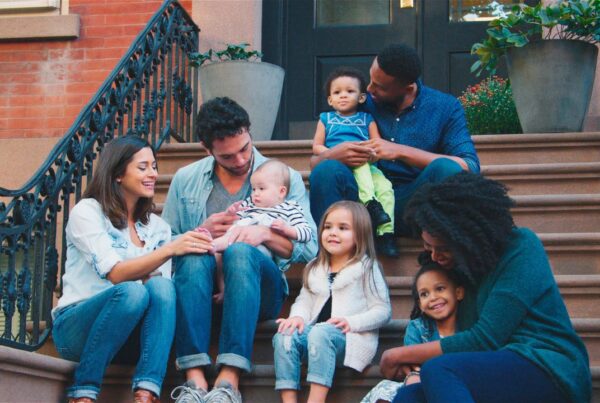Marking the 45th anniversary of KidsPeace Foster Care, Healing Magazine posed a series of questions about the programming to four of the organization’s experts:
- Ray Culp, Vice President of Programs
- Marnie Roberts, New York State Manager, Foster Care and Community Programs (FCCP)
- Patti Edwards, FCCP Quality and Compliance Coordinator
- Tara Koch, Program Manager, FCCP – Harrisburg, PA
————————
Healing Magazine: Before coming to work at KidsPeace, what was your view of foster care? Did anything immediately surprise you when you started?
Patti Edwards: I think once I got started, I was surprised at how some of the biological parents were so different than the way they are sometimes portrayed. They were human beings in some very difficult situations, and I soon learned that children wanted to be with their biological families regardless of their situations.
The better I did with recognizing this reality, and the more I was able to help foster families accept that kids they took into their homes weren’t going to be “grateful,” the more likely it was that placements could be successful.
Ray Culp: Honestly, I didn’t know much about it. I was working in residential and didn’t really know anything about foster care. Did anything immediately surprise me? Yes – how unbelievably giving the foster parents were of their time and their love to the kids.
Tara Koch: When I first started, and still many years later, I am surprised by the resiliency many children display after going through some of the hardest circumstances. There are certain children and cases that I will never forget working with, that have helped to shape my own life perspective.
Marnie Roberts: Prior to coming to KidsPeace I worked at the county Children and Youth Office. I had a caseload of 36 families and over a hundred children to see monthly. All my experience in foster care prior to my employment at KidsPeace was favorable. I came to KidsPeace looking forward to a reduced, more manageable caseload. What surprised me was how busy I was with only 12 – 22 kids on my “reduced” caseload. KidsPeace did so much more in terms of support to our families and children.
——————–
HM: What is a quality or personality aspect of successful foster families that you feel is overlooked or not recognized as contributing to their ability to provide a positive environment for kids in their care?
PE: Definitely sense of humor. Being a foster parent is a million times harder than being a parent to your biological children, and having a sense of humor not only helps parents to cope but it can also help the children in their care to be more at ease. Flexibility, empathy, and being open-minded are also very important traits.
MR: Effective parenting for traumatized kids thrives on altruism and compassion. It’s essential for parents to empathize with their children’s past experiences and remain calm during challenging situations. By modeling positive behavior and teaching de-escalation techniques, parents can foster a nurturing environment. Collaboration with support workers is crucial, ensuring that both children and families receive the guidance they need to thrive together.
TK: The foster care system can sometimes feel like a roller coaster, and the best interests of the child should be the grounding force. If a person possesses a “go with the flow” mentality, it is definitely beneficial to help the child feel safe and comfortable, as well as contributes to less stress for the caregiver.
———————
HM: Same question, but this time about caseworkers or family resource specialists: What qualities do you think contribute for success in those roles?
RC: For caseworkers and family resource specialists it comes down to being able to make a connection, to be supportive and personable without breaking boundaries and becoming friends with clients.
TK: Some qualities that help caseworkers and family resource specialists to be successful are: strong organization skills, the ability to prioritize and reprioritize because the needs of the day are constantly changing, and a flexible attitude. There are countless things on the “to do” list, but the caseworkers who approach the day with positivity seem much less stressed than those who start the day expecting problems.
MR: While we can teach the technical aspects of the job, the ability to connect with others is a special quality that’s often innate. Workers also need to exhibit sound judgment and strong organizational skills. Being diligent and proactive is key to achieving positive outcomes. Above all, our primary responsibility is to ensure the safety of the children in our care, providing them with a stable and loving environment. While understanding the child welfare system is crucial, what truly matters is that we demonstrate we care. People often remember how we made them feel, more than the knowledge we bring with us.
PE: I also think it’s very important for caseworkers and family resource specialist to not judge families, kids, and foster families based on personal values and convictions. As long as there is not a danger to the client, having families who have different values, who live different lifestyles and believe in different philosophies can actually be assets if we are willing to listen and even learn from each other.
——————
HM: The number and breadth of services provided through KidsPeace’s foster care offices have grown tremendously in the past few years. In your mind, what are the main factors that led to this evolution/expansion of services under the “foster care” umbrella?
PE: The market has definitely changed. The focus on in-home care is much more prominent now than it had been in the past. Keeping families together is also a higher priority than it had been. I think there is more of a recognition that parents can have issues, problems or struggles, but it doesn’t mean they are incapable of caring for their children if they are given proper support and services. And the reality is also financial – states, counties, etc., don’t have or don’t want to spend money on out-of-home care.
TK: As time goes on, there are a number of factors in play. We learn more about the brain and how the brain works, and in turn, how to work best with traumatized children. There has also been a reduction in the amount of families who have interest in fostering. One change we’ve seen in our own office is the expansion of kinship services, where a child stays with a family member, friend, or someone they know in some capacity. Although it can come with its own set of challenges, kinship placements can help children feel more comfortable when it’s not possible to remain with either one of their parents.
———————–
HM: What further changes do you expect to see in the foster care field in the next five years?
TK: I believe kinship care will continue to evolve to keep kids with their family members whenever possible. I think changes will come to make it more attainable for a family member to be a kinship provider, as some of the requirements can currently be daunting for people.
PE: I think the trend away from out-of-home care is going to continue and strengthen. The problem is there is often a lack of services and staff available for in-home care. This can lead to situations that cause further deterioration and then may necessitate a level of care far above foster care.
MR: The Families First federal legislation has made significant strides in keeping children with their families whenever possible. When that’s not feasible, it encourages the involvement of extended family, mentors, friends, or professionals as valuable resources. By emphasizing supportive services within the biological home, both children and families can thrive together. This approach promises to enhance mental health growth in communities, ultimately leading to fewer out-of-home placements and fostering a more nurturing and natural environment for our kids.
RC: Its gradual extinction, in some ways certainly growing smaller. With the growing community-based services array, we are serving more kids in their homes, thus not needing foster care as greatly as in the past; that is a good thing. The other reason is sadly, families have not been as interested in foster care especially since COVID. Families just have not returned to the field, and we still get more referrals than we can meet. Lastly, funding for foster care agencies has not kept up with the cost of providing services and recruiting families. Increasingly, we need to pay more for staff and families and yet are not getting reimbursement enough to even cover our costs.
——————————-
HM: What advice would you give someone starting their career in foster care today?
PE: Recognize and celebrate even the “small wins” and help your foster parents do the same thing!! This job is HARD and no one does it for the money or prestige, but if you can end your day or week knowing that you made a positive difference, no matter how small, it will help power you through the days that nothing seems to go right.
Lean on “your team” – ask for help when you need it. Be honest with yourself and your team when you need support or you’re feeling overwhelmed or burned out.
Don’t be afraid or intimidated when you don’t know answers or solutions – it’s okay to ask questions and seek out answers. You never stop learning in this job whether your new to it or have been doing it for years and years.
RC: Be ready to understand that families come in all shapes and sizes, that the family that you were raised in might not be the same as families that you will serve. Understand that family dynamics vary and being supportive and non-judgmental will only help you to be successful in this field.
TK: Some days might feel frustrating, but have no doubt you make an impact on the families and the children you work with. Some decisions will be out of our control, and we have to have peace with knowing that at the end of the day, we have tried our best to do the right things for the kids and families we represent. After working in the field for many years, I’ve seen successes and failures, but there is always something learned to take forward.
MR: Starting a career in foster care can be both rewarding and challenging. Here are some pieces of advice:
- Embrace Empathy: Understand that every child has a unique story. Approach each situation with compassion and an open heart.
- Stay Educated: Continuous learning is vital. Seek training opportunities to deepen your understanding of trauma-informed care and the complexities of foster care.
- Build Strong Relationships: Collaborate with other professionals, foster families, and community resources. Strong networks are essential for support and guidance.
- Practice Self-Care: The work can be emotionally demanding. Make time for self-care and seek support when needed to maintain your well-being.
- Be Patient and Flexible: Things may not always go as planned. Cultivating patience and adaptability will help you navigate challenges effectively.






